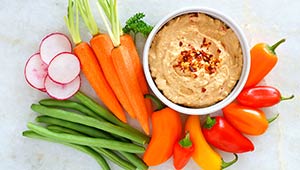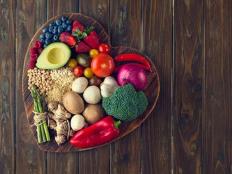While I experienced initial success with many of the popular programs, the weight loss never lasted. And sadly—each time I failed at dieting—I ended up heavier and more depressed, until one day when I finally said "enough."
Enough of coming up with excuses about why I couldn't do something because of my weight. Enough time wasted on searching desperately for the "quick fix" that was guaranteed to result in rapid weight loss. And most importantly, I said "enough" to the time and emotional energy spent equating my worth with my failure rate at dieting.
In April of 2010, I embarked on a long (and very slow) journey to lose a significant amount of weight. There were no gimmicks or quick fixes. No crash diets or extreme exercise. And definitely no promises that "tomorrow I will start my diet." Just a whole lot of determination and drive to get healthy.
Here are the 12 simple diet and nutrition tips that helped me lose 75 pounds—and keep it off.
Change your mindset.
1 of 13
After decades of starting, stopping and restarting the same diets, I realized my success came down to one thing: mindset. The only way to produce long-lasting positive results is to flip the script on the negative thoughts that play in your head and replace them with one simple statement: "I can."
Tip: Instead of a mental message that focuses solely on losing or quitting something (losing weight, quitting sugar, etc.), focus on what you want to gain. Looking at your goals from a position of strength and positivity will help you make lasting change.
Find:
Nutrition TipsTrack your day.
2 of 13
Using a nutrition tracker or food app is a quick and easy way to get a snapshot of your daily food intake. But in order to see results, you must be motivated to make dietary changes and be willing to put the time into using the app correctly.
Tip: Try to choose an app that has a barcode scanner. This will save you tons of time and frustration trying to track down nutritional information.
Find:
Nutrition TipsTake pictures.
3 of 13
Long before Instagram became the "go to" for diet and nutrition pictures, I was using my phone to capture images of what I ate over the course of a few days. This technique became my accountability buddy and helped me see how my diet was progressing.
Tip: Each week, I would choose two days to snap pictures and document my food intake. At the end of the month, I would compare the days and look for any unhealthy patterns that needed to be addressed, as well as celebrate the month's successes.
Find:
Nutrition TipsPractice balance in your meals.
4 of 13
Building your diet around lean protein, fruits, vegetables, healthy fats and complex carbohydrates will help you eliminate processed food and excess sugar.
Tip: Look at your day from an 80/20 philosophy: 80 percent of your day is made up of the core nutritional building blocks, and the remaining 20 percent is to be used at your discretion.
Find:
Nutrition TipsEat breakfast.
5 of 13
Are you someone who skips breakfast as a method to save calories and speed up weight loss? When you wake up, the blood sugar your body needs to power your muscles and brain is usually low, and breakfast helps replenish it. Not to mention, it kick starts your metabolism and gives you the much needed energy to make it through the day.
Tip: Pair a breakfast burrito (tortilla filled with black beans, eggs and salsa) with fresh fruit and a handful of raw almonds, try a protein pancake recipe (make your usual pancakes, but add a scoop of protein powder), whip up some scrambled eggs with veggies and red potatoes or blend a protein shake/smoothie with coconut or almond milk combined with fruit, yogurt, flax seeds and protein powder.
Find:
Nutrition TipsMake sure to eat protein throughout the day.
6 of 13
Eating protein throughout the day was the most important dietary change I made in order to lose weight. Protein keeps you feeling full longer, and it also helps preserve muscle mass and encourages fat burning.
Tip: Dr. Paul Arciero, DPE (Doctor of Physiology of Exercise) suggests the following protocol for protein pacing: four to six evenly spaced meals per day, each containing 20 to 40 grams of protein.
Find:
Nutrition TipsMeal prep like a pro.
7 of 13
Food prep is one of the easiest ways to keep you organized and focused on making healthy choices all week long. By planning, making and storing your meals before a busy work week, you can save time, money, calories and stress.
Tip: Have pre-cooked/prepared food available in your refrigerator, including lean sources of protein (chicken, ground beef, turkey, salmon, eggs, etc), rice, quinoa, pre-soaked beans, mason jar salads, low-fat dairy and sweet potatoes cut up into fries. Twice a week, clean and cut up half of your produce and place into ziplock bags or containers for easy grab and go.
Find:
Nutrition TipsEat for performance.
8 of 13
When you shift your mindset about nutrition and weight loss, it allows you to view food as a way to fuel performance. As soon as I separated emotion from eating (easier said than done), and started treating food as nourishment, my workouts improved. I increased my calories in order to add miles to my weekly runs and exercise at a higher intensity, and wouldn't you know, the weight started coming off.
Tip: If you workout in the morning, try eating a small snack such as whole grain toast with almond butter or a yogurt parfait (1/2 cup of whole grain cereal, 1/4 cup yogurt and 1/2 cup strawberries).
Find:
Nutrition TipsSwap white for rainbow colors.
9 of 13
I have a love/hate relationship with sugar, and the only way to maintain harmony is to enjoy it in moderation. Eliminating the sweet stuff has never really worked for me, so instead, I spend the majority of my day eating from the rainbow (fruits and vegetables), and indulge in chocolate or a bowl of ice cream when the urge strikes.
Tip: Include a fruit and/or vegetable from the rainbow at each meal. Foods such as tomatoes, spinach, squash, beans, kale, eggplant, avocados, blueberries, strawberries, pomegranates, raspberries, apples, oranges, etc.
Find:
Nutrition TipsFat is not the enemy.
10 of 13
For years we were told that eating fat will make you fat. And while fat does have more calories per gram than carbohydrates and protein, it also provides energy, helps you absorb vitamins and is essential for normal growth and development.
Tip: Focus on unsaturated fats (monounsaturated and polyunsaturated), which contain omega-3 and omega-6 fatty acids. Foods like salmon, flaxseeds, almonds, avocados and olive oil are all excellent sources of these essential fats.
Find:
Nutrition TipsNo food is off limits.
11 of 13
Full disclosure: I LOVE chocolate. And no matter how many times I have vowed to "give it up," for "X" amount of days, I always come right back to my favorite indulgence. That's why I took ALL foods out of "time out" and allowed myself to learn how to eat again.
Tip: Ditch the restrictive mentality that often comes with dieting. Work on embracing your love of all foods and create a plan that allows you to eat what you want in moderation.
Find:
Nutrition TipsEat a combo of protein and fat before bed.
12 of 13
I am an early morning exerciser—like 4:30 a.m. early! Eating at o'dark hundred is not the most fun thing to do, so in order to not wake up starving, I broke the most frequently heard weight loss rule in the history of diets: I ate before going to bed. And guess what, I still lost weight!
Tip: If you are hungry before you go to bed, EAT. String cheese and a few almonds, whole grain toast with almond butter or a healthy protein smoothie are all great options.
Find:
Nutrition TipsAbout the Author







Discuss This Article